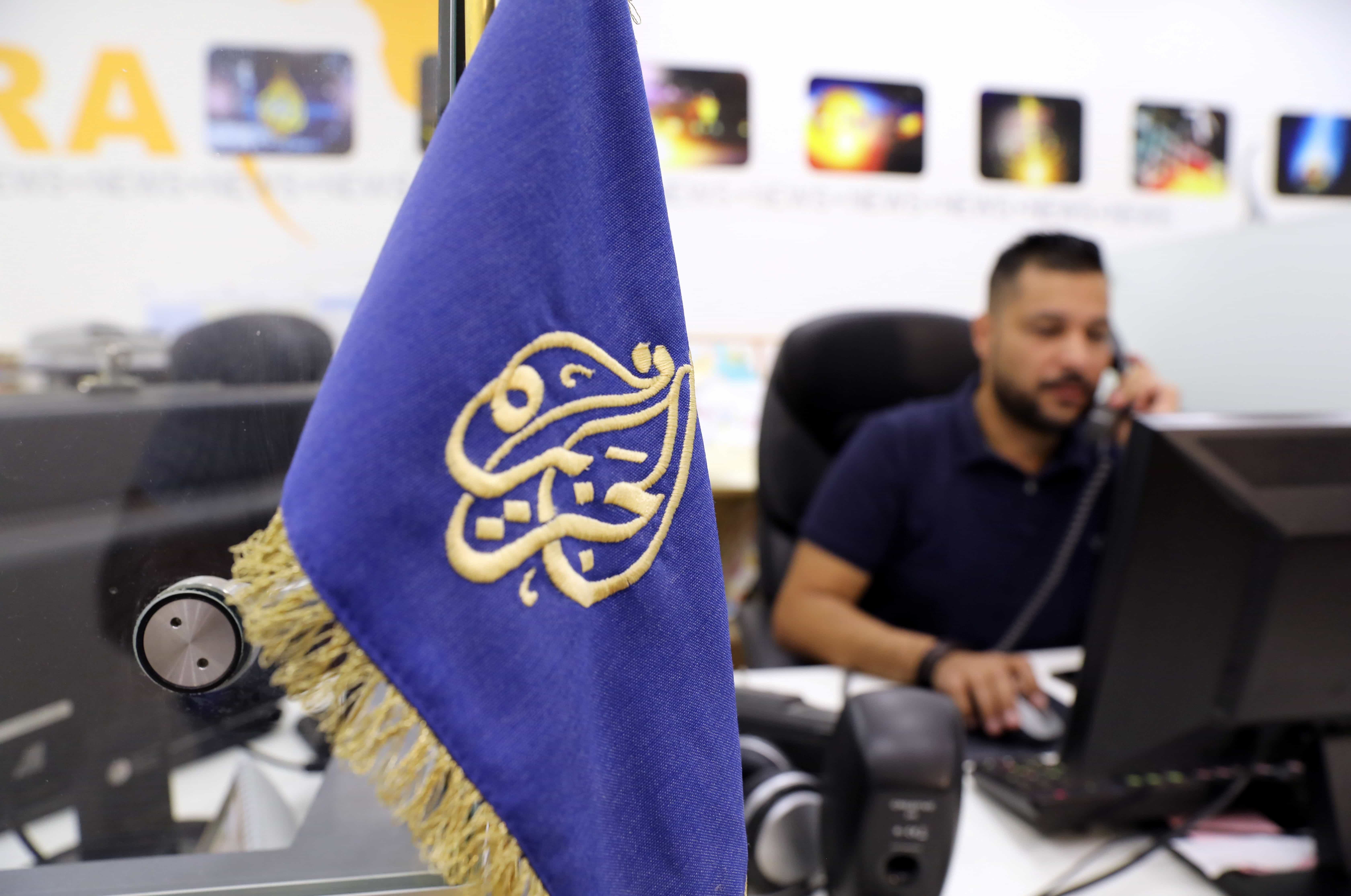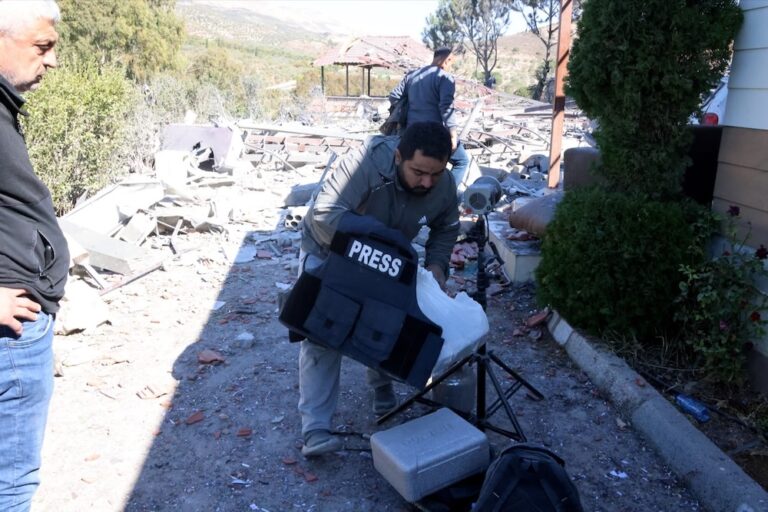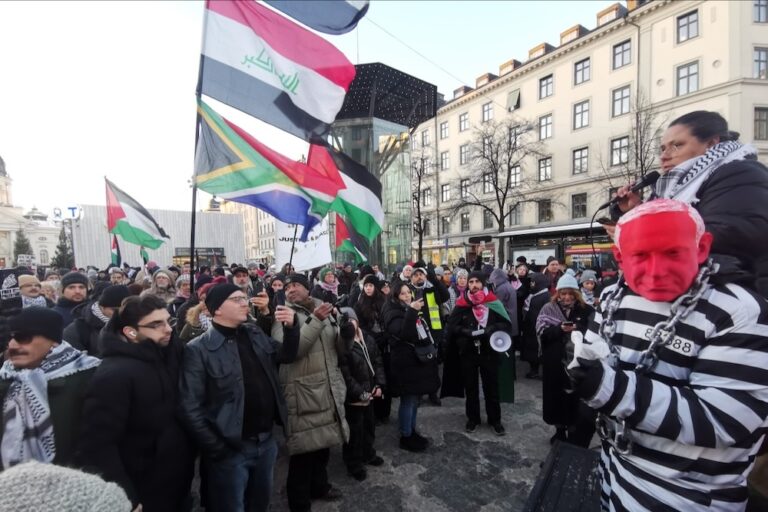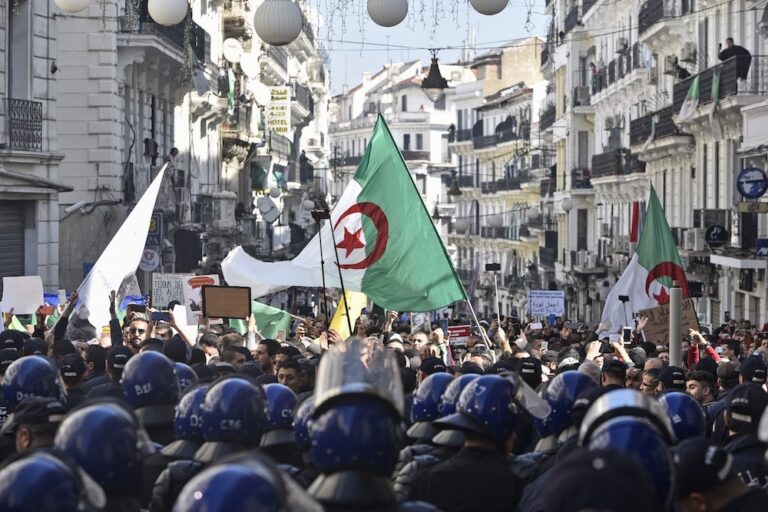Whether authoritarian regimes, so-called democracies or warring armed groups, those who wield power in the Middle East and North Africa have taken internet censorship to new levels and stepped up their individual campaigns against critics, journalists, and opponents this month.
Whether authoritarian regimes, so-called democracies or warring armed groups, those who wield power in the Middle East and North Africa have stepped up their individual campaigns against critics, journalists, and opponents this month.
Israel joins war on Al Jazeera
Early on in August, Israel joined Saudi Arabia, the United Arab Emirates, Egypt, Bahrain and Jordan in calling for the Qatari-owned Al Jazeera network to be banned. Arab state leaders did so as part of a wider dispute with Qatar that started in late May, and Israeli Prime Minister Benyamin Netanyahu, who has long accused Al Jazeera of bias in its coverage of the occupation, used the momentum to launch his own attack against the network.
During clashes around the Al-Aqsa Mosque in Jerusalem last month, Netanyahu accused Al Jazeera of “continuing to stir violence” and said he wanted it removed from Israel. On 6 August 2017, Israeli communications minister Ayoub Kara announced that he intended to close the network’s offices in Israel, revoke its journalists’ press passes and cut off its cable and satellite broadcast links in the country.
Free press groups, including the Committee to Protect Journalists, Reporters Without Borders, Index on Censorship, and the Palestinian Center for Development and Media Freedoms, decried Israeli plans to drive out Al Jazeera as a clear violation of press freedom.
“Censoring Al-Jazeera or closing its offices will not bring stability to the region, but it would put Israel firmly in the camp of some of the region’s worst enemies of press freedom,” CPJ Middle East and North Africa Program Coordinator Sherif Mansour said. “Israel should abandon these undemocratic plans and allow Al-Jazeera and all journalists to report freely from the country and areas it occupies.”
Governments take internet censorship to new levels
Since President Abdel Fattah El Sisi took control of Egypt in 2014, the media have been subjected to intense pressures.
“Journalists are often imprisoned or subjected to judicial harassment, media outlets are censored or controlled, and new media are under the regime’s thumb,” stated RSF.
Over two months ago, Egypt re-centered its gaze on the internet. It blocked access to 21 websites including Al Jazeera, Mada Masr, and the Arabic-language version of Huffington Post. This month, according to monitoring by the Association of Freedom of Thought and Expression (AFTE), that number has mushroomed to over 400 websites including ones providing VPN and Proxy services.
The website of the Arabic Network for Human Rights Information (ANHRI), an IFEX member, was the first one belonging to a human rights group to be blocked. In a 6 August statement published to Facebook, ANHRI condemned what many have deemed an arbitrary and unconstitutional move:
“The Arabic Network for Human Rights Information – in spite of this attack, which is a mockery of the Egyptian law and constitution by the authorities, who are supposed to respect and uphold the law – remains committed to its mission to defending freedom of expression, human rights in the Arab world, exposing the violations in this part of the world, and speaking up for the victims, which is a role that now comes at a very high price more than ever, yet it also became more important than ever before.”
RSF’s website was blocked soon after.
“This extensive digital blackout in Egypt is not just a grave attack on freedom of information,” said Alexandra El Khazen, the head of RSF’s Middle East desk. “It is also indicative of a fear on the part of the regime that an informed public could pose a threat to its stability.”
In Palestine, a highly controversial cybercrimes law adopted on 24 June was put into effect this month with five journalists suffering its consequences. According to Global Voices, the Palestinian Authority (PA) arrested the journalists on allegations that they “leaked information to hostile entities.” The five journalist were all arrested on 8 August from various cities in the West Bank.
An English translation of the law was published by 7amleh – The Arab Center for the Advancement of Social Media here.
“The clampdown on journalists has caused an uproar among other Palestinian journalists and activists who have launched a campaign on social media platforms under the Arabic-language hashtag #وين_الصحفيين ( ‘where are the journalists’) and #الصحافة_ليست_جريمة (‘Journalism is not a crime’), to demand the immediate release of the journalists, and denounce the PA’s use of the cybercrime law to repress media freedom,” said the Global Voices statement.
According to CPJ, the arrests came amid an escalating crackdown on the media in the West Bank. In a statement published on 10 August, it recounted several of the attacks Palestinian journalists were subjected to over the past couple of months at the hands of both Palestinian and Israeli forces.
Focus on gender
In Jordan, access to an already blocked LGBTQI+-friendly online magazine was ordered blocked again by the Jordanian Audiovisual Commission, a government regulator, on 31 July. The order followed a complaint from Member of Parliament Dima Tahboub, the spokesperson of the Jordanian Islamic Action Front (IAF), after an altercation on Twitter between her and the founder of the online magazine.
“The petty abuse of Jordan’s Press and Publications Law to censor the online magazine My.Kali – which was in fact already blocked in Jordan – in response to a Twitter spat underlines the necessity of reforming this law,” CPJ Middle East and North Africa Program Coordinator Sherif Mansour said from Washington, D.C.
Jail sentences, court orders, and legal action
In Iran this month, good news was repeatedly offset with bad news. While a journalist and four administrators of a group on the instant messaging app Telegram were released on bail on 30 and 31 July, a week later, the wife of imprisoned citizen journalist Soheil Arabi was arrested and detained. Her family has still not been told why she was arrested or where she is being held.
On 11 August and 21 August, two journalists were arrested at their places of work. On 12 August, a women’s rights activist was sentenced to three years in prison, and on 29 August, two women journalists were released provisionally after having been held in different sections of Tehran’s Evin prison for several months each.
Using a different form of media repression, Iranian authorities issued an order banning 152 journalists and media workers with the BBC’s Persian service – itself banned in Iran – from buying or selling assets. CPJ called on authorities to reverse the order, cease harassing BBC employees, and lift the ban on the station.
In Iraq, authorities set their eyes on the pro-Kurdish broadcaster NRT and political satirist Ahmed Al-Basheer. On 10 August, the Iraqi Communications and Media Commission sent a letter to NRT threatening to pursue “legal action” if unspecified “violations” committed by Al-Basheer’s show continue. The show mocks politicians and armed groups and begins each episode with a reminder that the Iraqi constitution guarantees freedom of speech. Al-Basheer has continued his work unhindered.
Abductions in Yemen and death threats in Libya
In Yemen, in both areas under Houthi-Saleh control and in areas where the Hadi government – backed by Saudi Arabia and the United Arab Emirates – retain authority, journalists and activists have been detained, threatened, harassed, beaten up, and forcibly disappeared.
In Sanaa on 14 August, prominent activist Hisham Al-Omeisy, an important public voice in Yemen, was arrested by Houthi authorities. He remains in detention today without access to a lawyer. In Taiz on 22 August, a local freelance journalist was abducted by armed men dressed in civilian clothing. And in Shabwa, two journalists were injured in a Saudi-led airstrike on 30 July on a building housing the offices of the Al-Maseereh broadcaster.
In Libya, after several Libyan writers and literary critics released a new collection of short stories and essays entitled Sun on Closed Windows in May, they have received death threats, insults and have been the target of hate speech, according to PEN international. Fearing for their lives, some are currently in hiding.
The attacks started after a literary event featuring some of the contributors took place on 26 August at a public library in the city of Zawiya – controlled by an Islamist group in the absence of government presence. The Islamist group arrested the event organizer and ordered the public library closed to prevent any further literary events. The event organizer was released the following day. Libyan authorities also condemned the book’s content and considered it against ‘public morality’, legitimizing the actions of the Islamist group.
“Through their actions and statements the Libyan authorities are undermining freedom of expression. Instead of supporting the writers and editors who are targeted by a religious group, the Ministry of Culture has condemned the contents of a book which is a work of literature. Libyan authorities should take all necessary measures to protect the life and the safety of the writers, editors, and all those involved with the book, and take effective steps to investigate and prosecute those who are threatening their safety, and uphold the writers’ right to write and readers’ right to read,” said Salil Tripathi, chair of PEN’s Writers in Prison Committee.
In Memory: Bassel Khartabil
On the first day of August this year, the international free expression community received a hard blow when it was announced that the software engineer and internet pioneer, Syrian-Palestinian Bassel Khartabil, was extrajudicially killed in Syria. For five years since his arrest on 12 March 2012, international, regional, and local human rights groups and civil society organisations have joined forces to steadily and consistently call for his release. After his forcible disappearance in 2015, groups demanded that Khartabil’s location be revealed. Every year on the anniversary of his arrest and every year on the anniversary of his disappearance, people around the world have come together to demand answers and pressure the Syrian government to free him. The news that Khartabil was in fact killed soon after his disappearance and that authorities failed to inform his wife, family and friends for two years reveals the chilling mercilessness of the Assad regime. In a 2 August statement, rights group condemned his execution and grieved the loss of an inspiring man.



